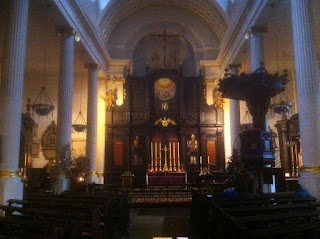I sense a ‘clear-out’ looming, and yes we
have a great many things we don’t really need. In such instances ‘stuff’ which
may once have cost a pretty penny becomes less important than space. I am
hopeful though that one battle has already been won.
Books.
I have rooms full of them and the main
accusation – that there are books I will never again read—misses the point
entirely.
You may as well argue the case for
recycling a Dorset cliff-face for road building, and stuff the
palaeontological record. Fossils? Who needs them? We have living breathing
animals. Archeology? Waste of time. Why preserve long forgotten Roman mosaics
when there’s a housing estate to be built?
Yes, I can appreciate a flaw in the
argument. My book collection may appear small beer compared to a major
palaeontological find, or an exquisite floor mosaic from 200 AD. But it is not
small beer to me.
Every one of these books has a memory or
story behind it – even those books I’ve barely read or skimmed.
When I was a student in Swansea, I scoured
second hand book shops and built up a good ‘Everyman’ library of some pretty
obscure books: The Letters of Lady Mary
Montague 1709 – 1762, The letters of
Oliver Cromwell, The speechs of William Pitt the Younger, Selected Speechs on
Public Questions by John Bright (now that is a dull book) Holinshed’s Chronicles, The Sermons of Hugh Latimer, The Speeches of
Disraeli, Ruskin – I could go on to list all fifty-two I eventually bought
during my time in Swansea but I’ll spare myself and you from the misery.
Now, I have read some of the more
interesting letters from Cromwell, I’ve even, to my shame and in private, read
aloud one or two of William Pitt’s war time speeches. They taught me one thing;
the man had fantastic breath control with his sentences in search of an
ending. I’ve sampled Hugh Latimer’s
sermons, and enjoyed the robust cadance of C16th speech. But I’ve read none of
those books from end to end,(other than Lady Montague’s letters – she’s a star)
and it’s likely I’ll never open their
pages again. The point is those fifty-two books bring back memories of Swansea
and the aspirations of an earnest student.
If I go back further in the geological
record, you’re looking at my childhood and early teenage years, pulp scavenged
from church bazars, and books I actually bought. No way could I get rid of my
James Bond paperbacks, my Michael Moorcock, Robert E Howard, H P Lovecraft
collections, or my complete set of ‘The Saint’ (yellow paperbacks) by Leslie
Charteris.
With regard to the latter, I cheated. I
ended my childhood with about a third of ‘The Saint’ books, but Heaven took
pity on me. God is a bibliophile. Harewood House has a wonderful second hand bookshop
close to the stables. They had every ‘Saint’ book, and I was in heaven. Now was
I buying them with the intent of sitting down and reading them all from cover
to cover? Quite obviously not. I was
buying back a fragment of childhood. I’d do the same if I ever found a complete
set of Biggles!
For those lucky enough to have been born in
great Northern Cities like Liverpool, you lived and breathed magnificent Victorian
buildings that uplifted the spirit without you always being aware of it. You
never felt obliged to explore every floor of those buildings to appreciate them
as monuments. Only years later you realise how privileged you were. Much the
same is true of books. Every closed book
is a world waiting to come to life. Now I am richer I can afford (and so can a
generous wife) fine folio editions of the works of Anthony Trollope. I feel
privileged to have them – not because I feel obliged to re-read every one of them.
Memories again.
I did my M. A. on Anthony Trollope and English Landed Society, and in the process
read about thirty of his forty-seven books. Paperbacks, heavily annotated and
most of them lost. In this respect my Folio editions of Trollope’s Barchester
and Palliser series are monuments to a wonderful time in my life. Yes, I will
re-read many of them – but I don’t have to. That is the point – other than the
fact I’d need another life to read all the books I’ve acquired over the years.
And have I mentioned my kindle yet – 900 books or more? What with the daily
Kindle deal offering books for 99 pence and a click, the temptation is often irresistible,
especially for one with the impulse control of a bonobo monkey: Edward Rutherfurd’s Sarum, London, New York, and Ruska at 99 pence each? I may never read
them, but they’re there, and it gives me great comfort. I guess I’m a glorified
squirrel, but at least my nuts are neatly shelved; an unfortunate image.
















